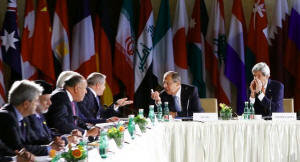|
Germany's Steinmeier says Syria talks to
focus on truce, aid
 Send a link to a friend
Send a link to a friend
[May 17, 2016]
By John Irish and Lesley Wroughton
VIENNA (Reuters) - Major power talks on
Syria aim to restore a truce across the country and get aid into
besieged areas to encourage opposition groups to return to negotiations
in Geneva, Germany's foreign minister said on Tuesday.
|

Russian Foreign Minister Sergei Lavrov (2R) and U.S. Secretary of State
John Kerry (R) attend the ministerial meeting on Syria in Vienna,
Austria, May 17, 2016. REUTERS/Leonhard Foeger |
|
 "We must find a way back into the political process ... It's about
improving the conditions for the ceasefire and humanitarian aid so
as to win the opposition over to negotiate with the regime in
Geneva," Frank-Walter Steinmeier said in Vienna ahead of a meeting
of 17 countries backing the talks. "We must find a way back into the political process ... It's about
improving the conditions for the ceasefire and humanitarian aid so
as to win the opposition over to negotiate with the regime in
Geneva," Frank-Walter Steinmeier said in Vienna ahead of a meeting
of 17 countries backing the talks.
Steinmeier spoke with journalists before the United States, Russia,
European powers and Middle Eastern states opened talks aiming to
revive a February "cessation of hostilities" agreement that managed
to reduce fighting for almost two months.
A recent surge in bloodshed in Aleppo, Syria's largest city before
the war, wrecked the partial truce sponsored by Washington and
Moscow that had allowed U.N.-brokered peace talks to convene in
Geneva.
The talks collapsed last month after the opposition walked away
following an increase in violence. Diplomats say the U.N. special
envoy for Syria Staffan de Mistura hopes to launch a new round of
negotiations by the end of May.
 He is trying to meet an Aug. 1 deadline to establish a transitional
authority for the country that would lead to elections in 18 months.
With humanitarian aid also only trickling through to besieged areas,
the main Syrian opposition's High Negotiations Committee has said it
would not resume talks until there is tangible progress on the
ground.
"We'll need to see the guarantors of the ceasefire - Russia and the
U.S. - putting something down that will really convince the
opposition that this process is worthwhile," said a senior western
diplomat involved in the talks.
"Sadly, I don't sense that and fear the U.S. will try to impose a
text that is excessively optimistic, but for which its
implementation will not be possible."
The Obama administration's failure to convince Moscow that Syrian
President Bashar al-Assad must go is fuelling European frustration
at being sidelined in efforts to end the country's five-year civil
war, diplomats say.
[to top of second column] |

Some diplomats and analysts question whether the United States has
misread Russia's desire to keep Assad in power.
A senior State Department official said the meeting would focus on
areas where the truce was most under threat.
"It needs to be on a more solid foundation than it is right now,"
the official said, adding that the meeting would also focus on
increased humanitarian access and on the political process.
Asked about the frustrations of U.S. allies with the current
approach, the official said: "Everybody’s frustrated. It’s not just
the allies being frustrated."
"The political deal is going to be done by Syrians at the table ...
it still is for Syrians to do. If we can help – all of us can help
get the parties there, nudging on both sides to get the parties
there, then fine. But they’re ultimately going to be the ones that
decide this."
(Additional reporting by Shadia Nasralla; Editing by Tom Heneghan)
[© 2016 Thomson Reuters. All rights
reserved.]
Copyright 2016 Reuters. All rights reserved. This material may not be published,
broadcast, rewritten or redistributed.
 |